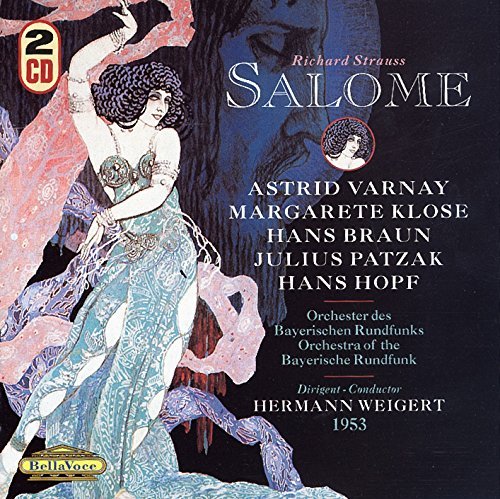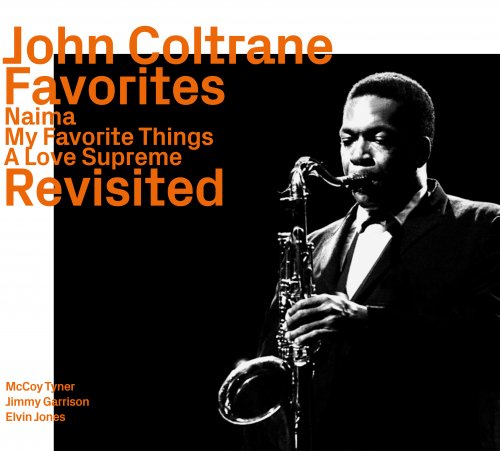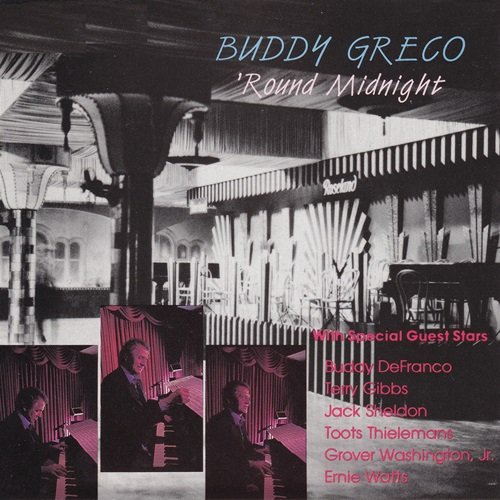Astrid Varnay & Herman Weigert - Richard Strauss: Salome (1996)

Artist: Astrid Varnay & Herman Weigert
Title: Richard Strauss: Salome
Year Of Release: 1996
Label: Bella Voce
Genre: Classical
Quality: FLAC (image + .cue, log, scans)
Total Time: 02:19:05
Total Size: 331 MB
WebSite: Album Preview
Tracklist:Title: Richard Strauss: Salome
Year Of Release: 1996
Label: Bella Voce
Genre: Classical
Quality: FLAC (image + .cue, log, scans)
Total Time: 02:19:05
Total Size: 331 MB
WebSite: Album Preview
CD 1
Scene 1
01. "Wie schön ist die Prinzessin Salome heute Nacht!" (Narraboth, der Page, erster Soldat, zweiter Soldat) - 02:42
02. "Nach mir wird Einer kommen, der ist stärker als ich" (Jochanaan, zweiter Soldat, erster Soldat, ein Kappadozier, Narraboth, der Page) - 02:36
Scene 2
03. "Ich will nicht bleiben. Ich kann nicht bleiben" (Salome, der Page) - 01:46
04. "Siehe, der Herr ist gekommen" (Jochanaan, Salome, zweiter Soldat, Narraboth, ein Sklave, erster Soldat) - 01:39
05. "Jauchze nicht, du Land Palästina" (Jochanaan, Salome, zweiter Soldat, erster Soldat, der Page, Narraboth) - 04:03
06. "Laßt den Propheten herauskommen" (Narraboth, Salome) - 02:25
Scene 3
07. "Wo ist er, dessen Sündenbecher jetzt voll ist?" (Jochanaan, Salome, Narraboth) - 03:52
08. "Er ist schrecklich. Er ist wirklich schrecklich!" (Salome, Narraboth) - 01:49
09. "Wer ist dies Weib, das mich ansieht?" (Jochanaan, Salome, Narraboth) - 02:49
10. "Jochanaan! Ich bin verliebt in deinen Leib" (Salome, Jochanaan) - 02:03
11. "Dein Leib ist grauenvoll" (Salome) - 02:22
12. "Zurück, Tochter Sodoms! Berühre mich nicht!" (Jochanaan, Salome) - 02:51
13. "Niemals, Tochter Babylons, Tochter Sodoms,.. Niemals!" (Jochanaan, Salome, Narraboth) - 01:15
14. "Wird dir nicht bange, Tochter der Herodias?" (Jochanaan, Salome) - 02:29
15. "Lass mich deinen Mund küssen, Jochanaan" (Salome, Jochanaan) - 00:52
16. "Du bist verflucht" (Jochanaan) - 03:59
Scene 4
17. "Wo ist Salome? Wo ist die Prinzessin?" (Herodes, Herodias, erster Soldat) - 03:28
18. "Salome, komm, trink Wein mit mir" (Herodes, Salome, Herodias) - 02:26
19. "Siehe, die Zeit ist gekommen" (Jochanaan, Herodias, Herodes) - 00:47
20. "Wahrhaftig, Herr, es wäre besser, ihn in unsre Hände zu geben" (erster Jude, Herodes, zweiter Jude, dritter Jude, vierter Jude, fünfter Jude, Herodias, erster Nazarener) - 03:18
21. "Siehe, der Tag ist nahe, der Tag des Herrn" (Jochanaan, Herodes, erster Nazarener, erster Jude, zweiter Nazarener, Herodias) - 02:28
22. "O über dieses geile Weib, die Tochter Babylons" (Jochanaan, Herodes, Herodias) - 02:14
23. "Tanz für Mich, Salome" (Herodes, Herodias, Salome, Jochanaan) - 03:59
24. Salomes Tanz der sieben Schleier - 08:48
25. "Ah! Herrlich! Wundervoll, wundervoll!" (Herodes, Salome, Herodias) - 03:25
26. "Salome, ich beschwöre dich, sei nicht trotzig" (Herodes, Salome, Herodias) - 02:49
CD 2
Scene 4
01. "Salome, bedenk, was du tun willst" (Herodes, Salome) - 02:43
02. "Gib mir den Kopf des Jochanaan!" (Salome, Herodes, Herodias) - 01:50
03. "Es ist kein Laut zu vernehmen" (Salome) - 02:19
04. "Ah! Du wolltest mich nicht deinen Mund küssen lassen, Jochanaan" (Salome) - 10:20
05. "Sie ist ein Ungeheuer, deine Tochter" (Herodes, Herodias) - 01:05
06. "Ah! Ich habe deinen Mund geküsst, Jochanaan" (Salome, Herodes) - 03:37
Bonus Tracks
Astrid Varnay (1918-2006)
07. Elektra: "Allein, weh ganz allein" (Monolog der Elektra) - 09:34
08. Der Rosenkavalier: "Da geht er hin" (Monolog der Marschallin aus dem 1.Akt) - 05:23
09. Der Rosenkavalier: "Die zeit, die ist ein sonderbar' - Ding" (Szene der Marschellin aus dem 1.Akt) - 02:09
10. Schlagende Herzen, op. 29/2 - 03:08
11. Winterweihe, op. 48/4 - 03:00
Julius Patzak (1898-1974)
12. Heimliche Aufforderung, op. 27/3 - 02:23
13. Ich trage meine Minne, op. 32/1 - 03:02
14. Ständchen, op. 17/2 - 03:19
15. Freundliche Vision, op. 48/1 - 02:27
16. Morgen, op. 27/4 - 02:38
17. Das Geheimnis, op. 17/3 - 02:09
Margarete Klose (1902-1968)
18. Geduld, op. 10/5 - 04:45
One of the most respected Wagnerian sopranos of the mid-twentieth century, Astrid Varnay was born in Stockholm, Sweden, the child of two celebrated Hungarian singers. After spending her infancy in Norway where her father had been engaged as a stage director in Kristiania, she moved with her parents to Buenos Aires and the Teatro Colón; finally, the family traveled on to the United States. After her father died tragically shortly before his 35th birthday, Varnay's mother turned to teaching in order to make ends meet, and Violet (as she was known then) eventually became her most accomplished student.
Astrid Varnay made a surprise Metropolitan Opera debut as Sieglinde on December 6, 1941, when the great Lotte Lehmann took ill and no other substitute was available. Varnay was already under contract for performances in the lighter Wagnerian soprano repertory beginning the following month, but her success in Die Walküre, broadcast nationwide, served notice that hers was a voice destined for larger roles. Just six days later, another indisposition put her on stage as Brünnhilde, an even greater challenge.
With careful supervision from Met general manager Edward Johnson, Varnay's appearances were rationed to prevent her from becoming a vocal casualty. The rigorous training she had received from her mother assured that a technique was in place to serve her well in the heaviest repertory. Beyond strong and confident singing was a histrionic aptitude that marked her as an exceptional actress. With a trim and agile figure, she moved with an ease and sense of purpose that set her apart from her contemporaries.
With the end of WWII, Varnay traveled to other venues. Her Isolde in London in 1948 prompted critic Ernest Newman to write that hers was one of the best sung and acted interpretations he had encountered in his long memory. When Kirsten Flagstad declined to sing at the Bayreuth Festival about to reopen in 1951, she suggested Varnay instead; the grandsons of Richard Wagner engaged her unseen and unheard. Her stunning performances in the minimalist productions of Wieland Wagner set new standards in opera performance, prompting the director to say, "Why do I need a tree on the stage when I have Astrid Varnay?"
Varnay was to be a mainstay at Bayreuth for 17 seasons. Although she made few studio recordings, live performances reveal a huge instrument of enormous depth (putting many a contralto to shame) with a top register of lacerating thrust and power. Her legendary Götterdämmerung Brünnhilde, recorded under conductor Hans Knappertsbusch in 1951 but not issued due to artist contract obstacles, was finally released to thunderous acclaim in 1999. Varnay's stature as sovereign singer and actress was confirmed in every measure of the exhausting role.
During the early 1950s, Varnay became increasingly aware of Met general manager Rudolf Bing's indifference to Wagner and turned her attention to other theatres in Europe: Maggio Musicale in Florence, Paris, La Scala, Salzburg (where she was an overwhelming Elektra) and Munich.
After three decades of singing the dramatic soprano repertory, Varnay gradually entered the realm of parts customarily sung by mezzo-sopranos. As she entered her mid-sixties, she then moved into cameo roles, brief appearances imbued with all the care and perception brought to her heroic repertory of earlier times.
Varnay's autobiography, written with Donald Arthur, was published in November 2000 under the title 55 Years in Five Acts: My Life in Opera. Her intelligence, perception, good humor, and generosity to fellow artists attest to why she was regarded as the best of colleagues. -- Erik Eriksson
Astrid Varnay made a surprise Metropolitan Opera debut as Sieglinde on December 6, 1941, when the great Lotte Lehmann took ill and no other substitute was available. Varnay was already under contract for performances in the lighter Wagnerian soprano repertory beginning the following month, but her success in Die Walküre, broadcast nationwide, served notice that hers was a voice destined for larger roles. Just six days later, another indisposition put her on stage as Brünnhilde, an even greater challenge.
With careful supervision from Met general manager Edward Johnson, Varnay's appearances were rationed to prevent her from becoming a vocal casualty. The rigorous training she had received from her mother assured that a technique was in place to serve her well in the heaviest repertory. Beyond strong and confident singing was a histrionic aptitude that marked her as an exceptional actress. With a trim and agile figure, she moved with an ease and sense of purpose that set her apart from her contemporaries.
With the end of WWII, Varnay traveled to other venues. Her Isolde in London in 1948 prompted critic Ernest Newman to write that hers was one of the best sung and acted interpretations he had encountered in his long memory. When Kirsten Flagstad declined to sing at the Bayreuth Festival about to reopen in 1951, she suggested Varnay instead; the grandsons of Richard Wagner engaged her unseen and unheard. Her stunning performances in the minimalist productions of Wieland Wagner set new standards in opera performance, prompting the director to say, "Why do I need a tree on the stage when I have Astrid Varnay?"
Varnay was to be a mainstay at Bayreuth for 17 seasons. Although she made few studio recordings, live performances reveal a huge instrument of enormous depth (putting many a contralto to shame) with a top register of lacerating thrust and power. Her legendary Götterdämmerung Brünnhilde, recorded under conductor Hans Knappertsbusch in 1951 but not issued due to artist contract obstacles, was finally released to thunderous acclaim in 1999. Varnay's stature as sovereign singer and actress was confirmed in every measure of the exhausting role.
During the early 1950s, Varnay became increasingly aware of Met general manager Rudolf Bing's indifference to Wagner and turned her attention to other theatres in Europe: Maggio Musicale in Florence, Paris, La Scala, Salzburg (where she was an overwhelming Elektra) and Munich.
After three decades of singing the dramatic soprano repertory, Varnay gradually entered the realm of parts customarily sung by mezzo-sopranos. As she entered her mid-sixties, she then moved into cameo roles, brief appearances imbued with all the care and perception brought to her heroic repertory of earlier times.
Varnay's autobiography, written with Donald Arthur, was published in November 2000 under the title 55 Years in Five Acts: My Life in Opera. Her intelligence, perception, good humor, and generosity to fellow artists attest to why she was regarded as the best of colleagues. -- Erik Eriksson



![Rick Braun - Intimate Secrets (1992) [CDRip] Rick Braun - Intimate Secrets (1992) [CDRip]](https://www.dibpic.com/uploads/posts/2026-03/1772427179_5.jpg)



![TO DIE ON ICE - PANORAMICA DEGLI ABISSI (2026) [Hi-Res] TO DIE ON ICE - PANORAMICA DEGLI ABISSI (2026) [Hi-Res]](https://img.israbox.com/img/2026-03/04/i035cvi4fbzbe1ld0i5vri7gk.jpg)
